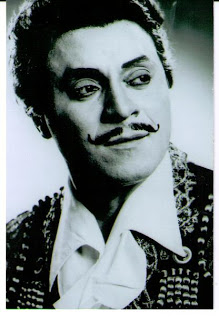Banned in the USA, William Ray made his name in European opera
mainThe death has been posted of William Benjamin Ray, a baritone from Lexington, Kentucky, who, unable to get work in racialist US concert halls and opera houses, found considerable success in Europe.
Georg Solti gave him a break in 1957 as Amonasro in a Frankfurt Aida. Others soon came calling.
Settling near Stuttgart, Ray went on to sing at Vienna, Hamburg, Milan, London, Brussels and Munich, and was cast in more than a dozen so-called ‘exotic’ roles on German network television.
Returning to the US in 1982, he taught voice at the Peabody in Baltimore for a decade, putting in a further decade at Howard University.
William Ray died on July 3, at the age of 94.






Even without the racism, many American opera singers have to build their careers in Europe since there is far more work there.
Isn’t the headline garish and incorrect? You seem to delight in posting headlines that are misleading but are designed to attract attention.
William Ray may have been a victim of Jim Crow laws but he was not banned in the US. He was born in 1925 in Lexington, Kentucky; he graduated from high school there, took voice lessons in Boston; entered the US army and was discharged in 1946 after which he returned to Kentucky to school at Kentucky State U. before attending the Oberlin music academy from which he graduated.
He sang in a chorus in Cleveland, Ohio, went to Germany where he performed in many operas but returned to the USA to teach at the Peabody Conservatory, Baltimore where he remained for 10 years. He then joined the voice faculty at Howard U. in 1992, became head of the music department there until his retirement in 2000.
Source: https://www.baltimoresun.com/obituaries/bs-md-ob-william-benjamin-ray-20190714-m25mjmbmnvblhhhoi4j5wklvlu-story.html
Still, I suppose the practice of not hiring black performers for operatic roles functioned just like a ban.
I have heard that Joan Sutherland used her star-power to secure employment in the US for a black conductor, basically by saying, “If you want me, you hire him, too.” Does anyone know more about that?